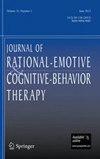对REBT测量的回顾集中在理性和非理性信念上
IF 1.4
4区 心理学
Q3 PSYCHOLOGY, CLINICAL
Journal of Rational-Emotive and Cognitive-Behavior Therapy
Pub Date : 2023-02-28
DOI:10.54382/krecbt.2023.3.1.7
引用次数: 0
摘要
本研究的目的是回顾基于Ellis的REBT理论的理性信念和非理性信念的测量量表,并讨论每个量表的特征。为此,本文概述了BITI、GABS、ABS-2 IPBI和IBT的工具。研究结果如下:首先,基于REBT理论的许多测量信念的工具只能测量非理性信念。其次,需要一种基于REBT理论的衡量理性和非理性信念的标准化工具,并且可以在国内应用。本研究对未来认知行为治疗研究的发展和认知行为治疗中使用合适的工具以及开发可应用于国内认知行为治疗临床实践的测量工具具有重要意义。因此,在通过标准化的测量工具在教育和临床环境中综合看待Ellis的理性和非理性信念的同时,还需要继续进行后续研究,研究能够根据国内文化和情况适当使用的测量工具。本文章由计算机程序翻译,如有差异,请以英文原文为准。
Review of the REBT measurements focused rational and irrational beliefs
The purpose of this study is to review the scales for measuring rational beliefs and irrational beliefs based on Ellis' REBT theory, and to discuss the characteristics of each scale. To this end, tools from BITI, GABS, ABS-2 IPBI and IBT are outlined. The results of the study are as follows. First, many tools for measuring beliefs based on the REBT theory are tools for measuring only irrational beliefs. Second, a standardized tool that measures both rational and irrational beliefs based on the REBT theory and can be applied domestically is needed. This study is considered to be meaningful in contributing to the development of future research and the use of appropriate tools used in cognitive behavioral therapy and the development of measurement tools that can be applied in domestic cognitive behavioral therapy clinical practice. Therefore, while looking at Ellis' rational and irrational beliefs in an integrated way in the educational and clinical settings through standardized measurement tools, follow-up studies on measurement tools that can be appropriately utilized according to the domestic culture and situation are expected to continue.
求助全文
通过发布文献求助,成功后即可免费获取论文全文。
去求助
来源期刊

Journal of Rational-Emotive and Cognitive-Behavior Therapy
PSYCHOLOGY, CLINICAL-
CiteScore
3.50
自引率
18.80%
发文量
49
期刊介绍:
The Journal of Rational-Emotive and Cognitive Behavior Therapy is an international journal that publishes scholarly original papers concerning Rational Emotive Behavior Therapy (REBT), Cognitive Behavior Therapy (CBT), behavior therapy, cognitive-behavioral hypnosis, and hypnotherapy, clinical and counseling psychology, psychiatry, mental health counseling, and allied areas of science and practice. The journal encourages scholarly debate amongst professionals involved in practice, theory, research, and training in all areas of scholarship relevant to REBT and CBT. The Journal is particularly interested in articles that define clinical practice and research and theoretical articles that have direct clinical applications. The Journal seeks theoretical discussions and literature reviews on the cognitive bases of the development and alleviation of emotional, behavioral, interpersonal, personality, and addictive disorders. We consider submissions on the applications of REBT and CBT to new areas of practice and client populations. The Journal considers the term Cognitive Behavior Therapy to represent a generic, overriding category or school of psychotherapy approaches that includes many different theories and techniques. The journals encourages research that clearly identifies the specific hypothetical constructs and techniques being measured, tested, and discussed, and the comparison of the relative influence of different cognitive processes, constructs, and techniques on emotional and behavioral disturbance. The Journal provides a timely introduction to unexplored avenues on the cutting edge of REBT and CBT research, theory, and practice.The Journal publishes:discussions of the philosophical foundations of psychotherapiestheory-buildingtheoretical articlesoriginal outcome research articlesbrief research reportsoriginal research on the support of theoretical models development of scales to assess cognitive and affective constructsresearch reviewsclinical practice reviewsempirically-based case studiesdescriptions of innovative therapeutic techniques and proceduresadvances in clinical trainingliterature reviews book reviewsUnder the guidance of an expanded, international editorial board consisting of acknowledged leaders in the field, the journal disseminates current, valuable information to researchers and practitioners in psychology, psychotherapy, psychiatry, mental health counseling, social work, education, and related fields.Manuscripts usually are less than 35 pages, double-spaced, and using 11 or 12-point font. If the authors need more space to communicate their research or ideas, they should write to the editors to discuss this issue and provide a rationale why more than the commended number of pages is needed.
 求助内容:
求助内容: 应助结果提醒方式:
应助结果提醒方式:


